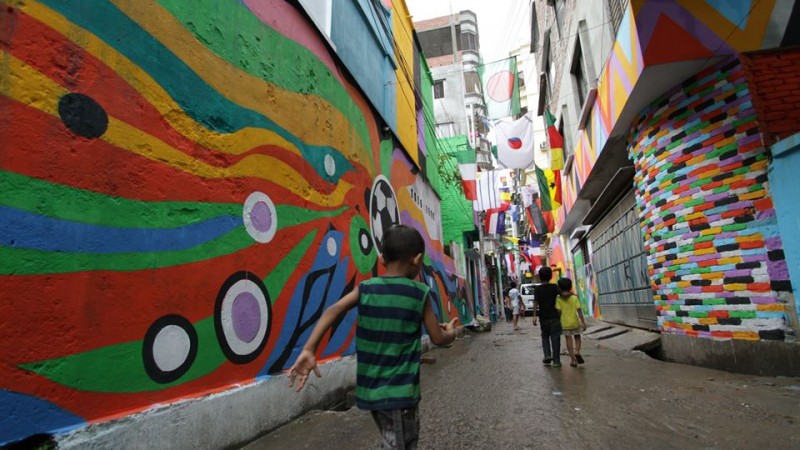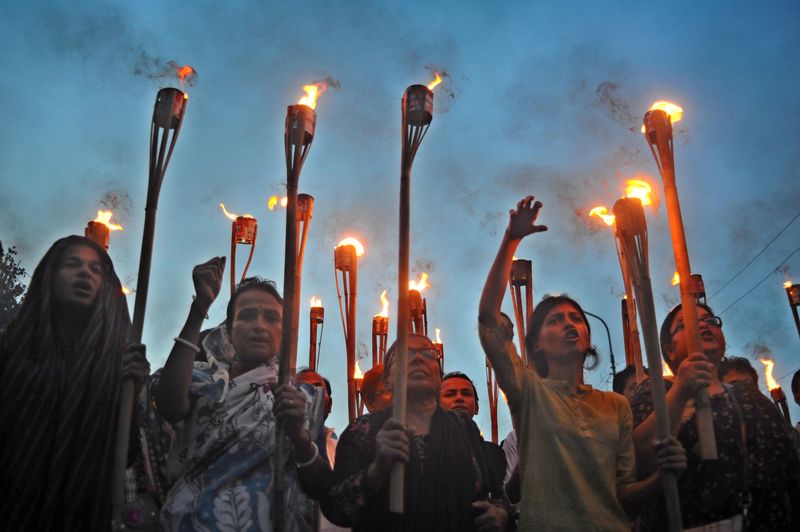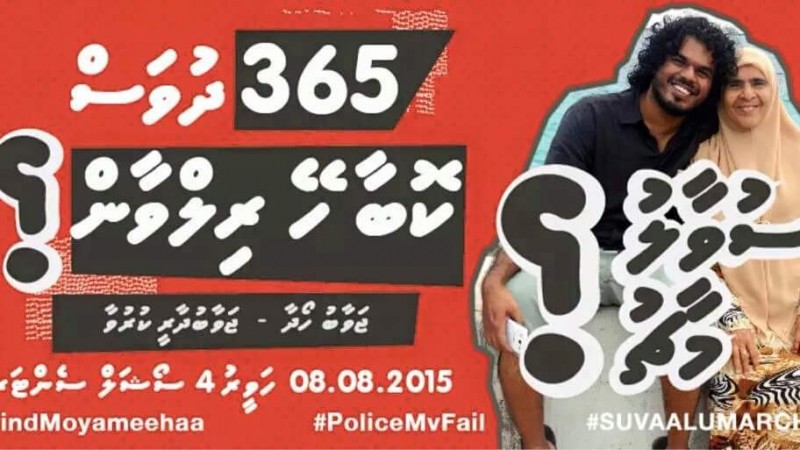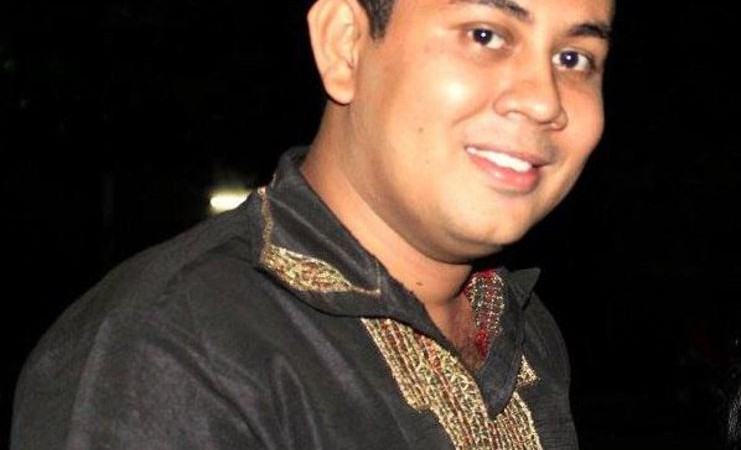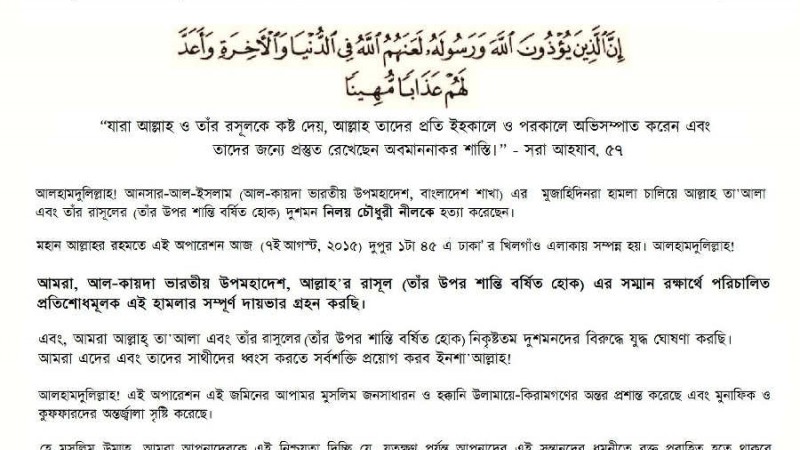assassination of secular blogger Niloy Neel but Bangladesh police authorities have made no significant progress investigating his murder. Neel was hacked to death by a band of five men who broke into his apartment in Dhaka, the nation's capital, on August 7, 2015.
Left shell-shocked by Niloy's killing -- which was the fourth assassination of a secular blogger in Bangladesh in 2015 -- many bloggers have stopping writing and some have gone into hiding. Some of the country's most active bloggers now fear they may face jail or will die at the hands of the assailants. Others have left the country.
The names of these bloggers and others under threat appeared on a list of 84 people submitted to a special government committee in 2013 by a group of conservative Muslim clerics who accused the bloggers of “atheism” and writing against Islam. Since then, eleven individuals on the list have been murdered.
Following Niloy's death, threats have extended beyond blogging communities. The proprietor of a publishing house that published multiple books by blogger Avijit Roy, who was slain in public in February of 2015, is now in danger as fundamentalist forces have identified him as a promoter of atheist ideology.
The day after Niloy's murder, Bangladesh Prime Minister Sheikh Hasina called Niloy's killers a "blot on Islam." She said in a meeting on August 8:
Haseeb also cited a recent press release from the Awami Ulema League, a conservative Islamic group claiming to support Bangladesh's ruling coalition:
On Sunday, Police Chief AKM Shahidul Hoque added fuel to the fire, saying:
Mr. Monirul Islam, another high police official, said:
Muktangon blog published a statement criticising the police response to the murder and saying that police should not be talking about bloggers hurting religious sentiments in an attempt to distract citizens from their failure to ensure public safety. Muktangon also noted that these bloggers were well aware of speech laws in their country:
The post was also published in Global Voices Online.
Left shell-shocked by Niloy's killing -- which was the fourth assassination of a secular blogger in Bangladesh in 2015 -- many bloggers have stopping writing and some have gone into hiding. Some of the country's most active bloggers now fear they may face jail or will die at the hands of the assailants. Others have left the country.
The names of these bloggers and others under threat appeared on a list of 84 people submitted to a special government committee in 2013 by a group of conservative Muslim clerics who accused the bloggers of “atheism” and writing against Islam. Since then, eleven individuals on the list have been murdered.
Following Niloy's death, threats have extended beyond blogging communities. The proprietor of a publishing house that published multiple books by blogger Avijit Roy, who was slain in public in February of 2015, is now in danger as fundamentalist forces have identified him as a promoter of atheist ideology.
The day after Niloy's murder, Bangladesh Prime Minister Sheikh Hasina called Niloy's killers a "blot on Islam." She said in a meeting on August 8:
Islam is a religion of peace. Those who want to taint it cannot have true faith in it. How dare they call themselves Muslims? [..]She continued:
And now they are murdering bloggers for writing against the religion. Who benefits from this gory mayhem? Which religion they claim to have been protecting?
We cannot let this happen in Bangladesh. The people of this country are peace-loving.In response, blogger Haseeb wrote in Sachalayatan wrote that for him, the Prime Minister's words rang hollow:
সরকার ব্লগারদের মতপ্রকাশের স্বাধীনতা বিষয়ে যতোটা না চিন্তিত, তার থেকে চিন্তিত তাদের ধার্মিক ইমেজ যাতে ক্ষতিগ্রস্থ না হয় সেটা নিয়ে। সরকার ধর্মীয় রাজনীতি তো বটেই, সেই ধর্মীয় রাজনীতি যারা করে তাদের আদর আপ্যায়নেই আন্তরিকতা দেখিয়েছে। আর ব্লগারদের মুখ বন্ধ করতে চালু করেছে ৫৭ধারার মতো কালো আইন।
The government is more concerned about keeping their pro-religion image, rather than worrying about freedom of expression. The government is endorsing religious politics and are soft on those who use religion for politics. And the bloggers are slapped with Section 57 [of the IT Act]...Section 57 of Bangladesh's IT Act criminalizes “publishing fake, obscene or defaming information in electronic form.”
Haseeb also cited a recent press release from the Awami Ulema League, a conservative Islamic group claiming to support Bangladesh's ruling coalition:
নাস্তিক হত্যাকারীদের বিরুদ্ধে ব্যবস্থা নেয়া মানে এই নয় যে, মিডিয়া ইসলাম বিদ্বেষী নাস্তিকদের হাইলাইট করবে। সুতরাং এসব নাস্তিক ব্লগার কর্তৃক বিভিন্ন ব্লগ, ওয়েবসাইট, স্যোসাল মিডিয়ায় কুরুচিপূর্ণ নাস্তিক্যবাদী লেখা বন্ধে ধর্ম অবমাননার জন্য মৃত্যুদন্ডের আইন প্রণয়ন করতে হবে। [..]
এদেশকে নাস্তিক্যবাদী দেশ বানাতে ইসলাম বিরোধী শিক্ষনীতি তৈরী করা হয়েছে। কুরআন-সুন্নাহ বিরোধী বক্তব্য যুক্ত ও ষড়যন্ত্রমূলক পাঠ্যপুস্তক অবিলম্বে বাজেয়াপ্ত করতে হবে। সাথে সাথে ইসলাম বিরোধী প্রচলিত শিক্ষানীতি বাতিল করতে হবে। ৯৮ ভাগ মুসলমানের এদেশের শিক্ষানীতি সম্পূর্ণ ইসলামিক করতে হবে।
The media should not highlight atheist writings in the name of speaking for the killers of the atheists. There should be the death penalty for those who write nasty and blasphemous things on blogs, websites and in social media.Haseeb writes:
The education policy of this country was developed to make this a country of atheists. The curriculum which contain words against the Quran and Sunnah should be confiscated. The anti-Islam education policy should be repealed. The education policy of this Muslim-majority country should be Islamic.
যে মুহুর্তে ক্ষমতাসীন আওয়ামী লীগের সহযোগি একটি দল এই সমস্ত অশ্লীল দাবিনামা ঢাকা শহরের রাস্তায় মাইকে উগরাচ্ছে তখন শেখ হাসিনা শীতাতপ নিয়ন্ত্রিত কনফারেন্স রুমে দাবি করছেন ধর্ম নিয়ে রাজনীতি করতে দেয়া হবে না। দুঃখিত মাননীয় প্রধানমন্ত্রী। এভাবে হবে না। ক্ষমতাসীন আওয়ামী লীগ সরকারের এধরণের অবস্থান সাংঘর্ষিক।
While an Islamic front, claiming to be supporters of the ruling Awami League, are talking about these demands using loud speakers in the streets, our Prime Minister is saying indoors that "we will not let religion be used for politics." Sorry, Madame Prime Minister. This is not right. There is a contradiction in the stance of the ruling Awami League.The Director of News of Ekattor TV Syed Ishtiak Reza asks:
ধর্মান্ধতা আজ আমাদের দেশের শান্তি বিঘ্নিত করছে। সেখানে ক্ষমতাসীন দলের সাথে সম্পর্কযুক্ত কোনও সংগঠন এমন বক্তব্য দিলেতো বলতে হবে, বিপদ দরজায়।
Fundamentalism has disturbed peace in our country. When we hear these kinds of statements coming from a group this close to the ruling party, we have to say, peril is near.However, in an interview Awami League joint general secretary Mahbub-ul-Alam Hanif stated:
Awami League does not have any wing or associate group by the name of Ulema League. They have no political link with the party.Hanif urged citizens not to confuse the Alami Ulema League with the Awami League, Bangladesh's current governing political party. According to reports, the people behind Awami Ulema League claim Prime Minister Sheikh Hasina as their leader, though their ideology and principles are different from Awami League ruling party. Whether the Awami League has any affiliation with the Awami Ulema League is unknown but no ruling party leaders have condemned their speech.
On Sunday, Police Chief AKM Shahidul Hoque added fuel to the fire, saying:
Free-thinkers and bloggers should not cross the limit of tolerance while expressing their views on religion. If any person is hurt by any writing, s/he may take legal action. They can file a case with the police. Everyone should obey the law.He added that the maximum punishment for the above crime 14 years' jail time.
Mr. Monirul Islam, another high police official, said:
যারা ব্লগারদের হত্যার সঙ্গে জড়িত এবং যারা হযরত মুহাম্মদ (সা.), ধর্ম ও কোরআন নিয়ে যুক্তিহীনভাবে আঘাত করে ব্লগে লেখে তাদের সকলকে আইনের আওতায় আনা হবে। কারণ যারা যুক্তিহীনভাবে ধর্ম নিয়ে ব্লগে লেখে তারাও উগ্রবাদী।
The killers of the bloggers and those who write on blogs attacking the prophet Muhammad, Islam and Quran all will be brought under law. Those who illogically write against religion in blogs are also extremists.These comments sparked an uproar among citizens who took to social media to express their outrage. Expat activist Rayhan Rashid tweeted:
Meet our InspectorGeneral. His message to the 'still-alive' bloggers: "DON'T CROSS THE LINE"! http://t.co/QR0yPkL4e4 pic.twitter.com/uGhjrerJrs
— Rayhan Rashid (@rayhanrashid) August 9, 2015
Renowned journalist Toufique Khalidi tweeted:
Is a police officer the one to judge or decide where to draw the line in this case? http://t.co/K0064FOtuY
— Toufique I. Khalidi (@ToufiqueKhalidi) August 9, 2015
An online petition launched by an unknown group is asking for the police chief's resignation.Muktangon blog published a statement criticising the police response to the murder and saying that police should not be talking about bloggers hurting religious sentiments in an attempt to distract citizens from their failure to ensure public safety. Muktangon also noted that these bloggers were well aware of speech laws in their country:
এ কথা সঠিক নয় যে, মানুষের ধর্মীয় অনুভূতিতে ব্লগাররা ঢালাওভাবে আঘাত করে যাচ্ছেন। কোনো কোনো ব্লগার তাঁদের মুক্তচিন্তা চর্চার অংশ হিসেবে কখনো কখনো হয়তো ধর্মের (সেটা সব ধর্মের ক্ষেত্রেই প্রযোজ্য) কোনো কোনো বিষয় নিয়ে কথা বলে থাকেন, কিন্তু তা তাঁরা নির্দিষ্ট স্থানে এবং সামগ্রিক আলোচনার ধারাবাহিক অংশ হিসেবেই করে থাকেন। প্রকাশ্যে জনসমক্ষে হট্টগোল তুলে তাঁরা কিছুই করেন না, যার ফলে মানুষ উত্ত্যক্ত বোধ করবে কিংবা আহত ও ক্রুদ্ধ হবে।
মতপ্রকাশের স্বাধীনতার মূল কথাই হল অপ্রিয় মতামত অপ্রিয় ভঙ্গিতে প্রকাশেরও পূর্ণ স্বাধীনতা, যতক্ষণ না তা কোনো সুষ্পষ্টভাবে সংজ্ঞায়িত নিরপেক্ষভাবে বিচারযোগ্য প্রচলিত আইনের কোনো বিধানের নিষেধের মধ্যে না পড়ে। তাই, যারা তাদের রাজনৈতিক বা অন্য কোনো হীন উদ্দেশ্যে ব্লগারদের উম্মুক্ত আলোচনা ও বক্তব্যকে খণ্ডিতভাবে যেখানে-সেখানে উপস্থাপনের মাধ্যমে বিভ্রান্তিকর পরিস্থিতির সৃষ্টি করে, উত্তেজনা সৃষ্টির চেষ্টা করে – সরকার ও আইনশৃঙ্খলা রক্ষাকারী বাহিনীর বরং উচিত তাদের বিরুদ্ধে আইনগত ব্যবস্থা নেয়া।
This is incorrect that bloggers are deliberately and across the board hurting other people's religious sentiments. Some bloggers mentioned and discussed some aspects of religion (many religions, not only Islam) in their online writings as a part of their freedom of expression and part of their discussion and context. But they never did it in public or agitated or hurt people directly.
The main thing of freedom of expression is that one should be free to express adverse opinions in a critical way that may not be liked or endorsed by all. People can do it as long as they are not breaking any existing law of the land. [Author's note: Bangladesh does not have Sharia law.] So those who are creating a disturbance and inciting hatred by terming the bloggers atheist and blasphemous by taking their words out of context should be identified and legal actions should be taken against them.
The post was also published in Global Voices Online.




















